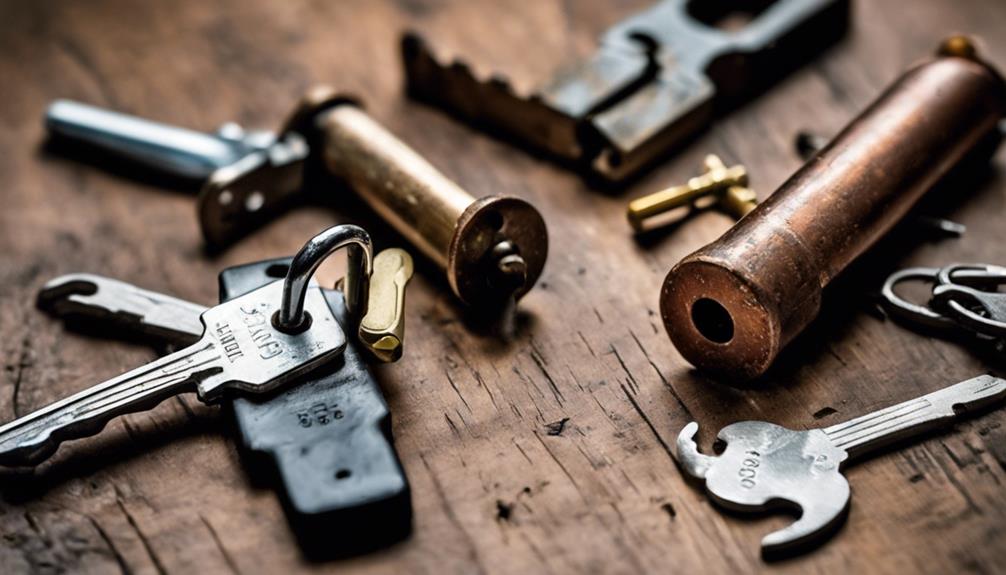Replacing a lock typically costs between $20 and $500, depending on the lock type and installation complexity. Basic deadbolts are more affordable, ranging from $20 to $50, while smart locks can push costs to $100 or more. High-security options may run you $150 to $500. Remember, labor costs vary too, usually falling between $50 and $150 per hour. Geographic location also plays a role, with urban areas often charging more due to demand. If you consider specific requirements and material quality, there's much more to the pricing than meets the eye. Explore further to see how to make the best choice!
Key Takeaways
- Basic deadbolt locks cost between $20 to $50, while smart locks range from $100 to $300 depending on features.
- High-security locks, ideal for commercial use, are priced between $150 to $500, offering enhanced protection.
- Labor costs for lock replacement vary from $50 to $150 per hour based on location and job complexity.
- Installation complexity can increase costs, especially for advanced locks requiring specialized tools and expertise.
- Geographic location impacts pricing, with urban areas generally having higher locksmith service fees than rural locations.
Types of Locks Available
When considering the types of locks available, you'll find a variety that caters to different security needs and preferences. Each type of lock comes with its own unique features, offering varying levels of security and convenience. For instance, deadbolts are often favored for their sturdiness, while smart locks provide modern technology and ease of access.
Additionally, it's important to be aware of the different lock replacement options and considerations for residential properties, as choosing the right lock can notably impact your home's security.
Understanding the average lock replacement cost is crucial in your decision-making process. While a basic deadbolt can be relatively inexpensive, a high-tech smart lock may come with a higher price tag. Several factors affect lock cost, including the lock's brand, the security level it offers, and any additional features like keyless entry or smart technology.
If you're serving others, considering their specific security needs is critical. You'll want to make sure that the lock you choose not only fits your budget but also provides peace of mind. By weighing your options, you can make an informed decision that best suits the needs of those you aim to protect.
Ultimately, investing in the right lock type will enhance security and provide confidence in your choice.
Labor Costs Breakdown
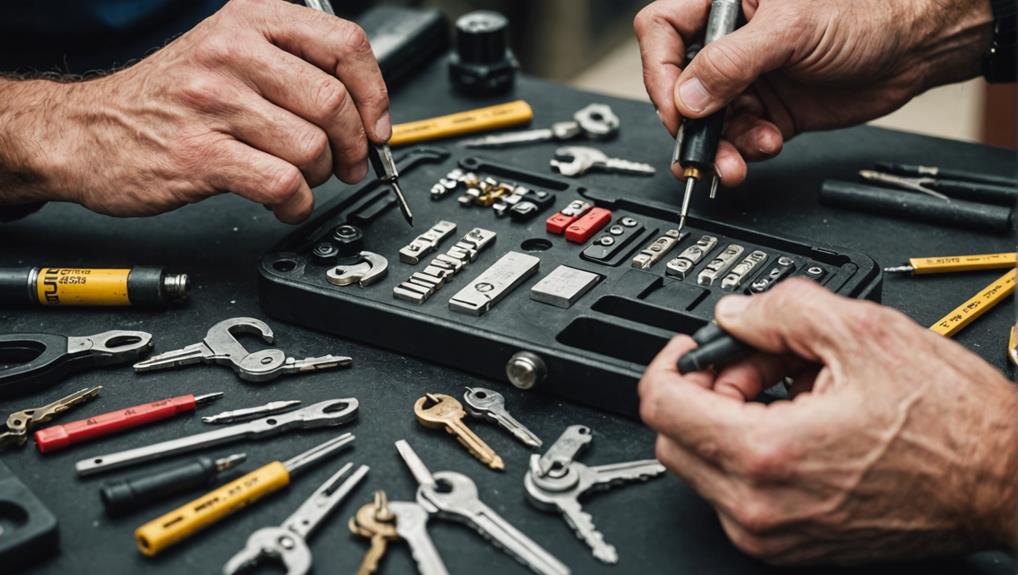
Understanding labor costs is essential when budgeting for a lock replacement. The cost to replace a lock isn't just about the lock itself; it also includes the labor involved. Typically, locksmith pricing varies based on factors like your location and the complexity of the job.
For instance, if you're replacing a simple door lock, the labor might be less than if you're dealing with a high-security system. Additionally, the costs involved in hiring a professional can vary considerably, so it's worth considering your specific needs.
Most locksmiths charge either a flat fee or an hourly rate, often ranging from $50 to $150 per hour. You'll want to ask about their pricing structure upfront to avoid surprises.
Additionally, if the job requires extra services—like rekeying existing locks or installing multiple locks—this can increase your lock replacement expenses.
Security Features Impact
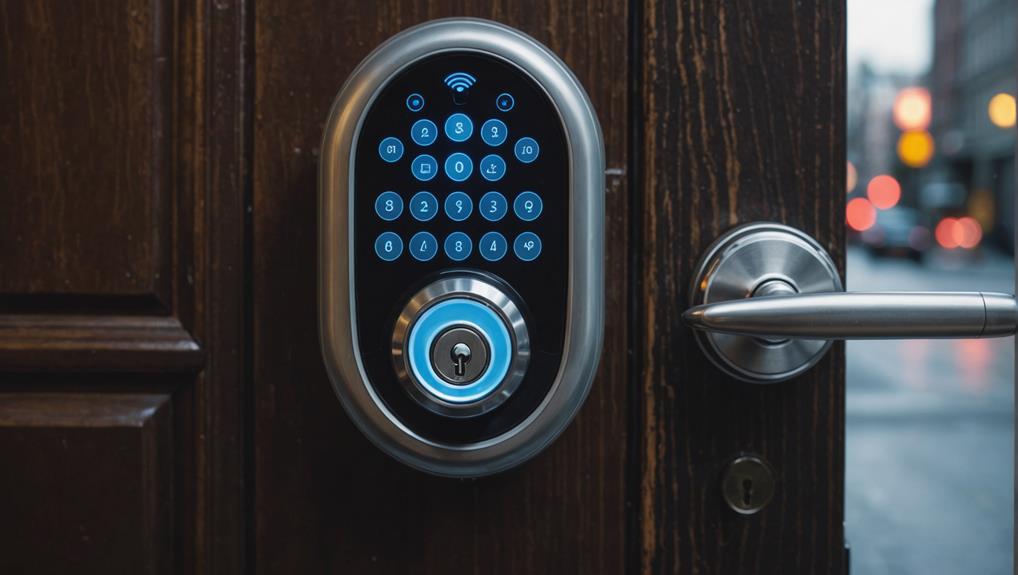
When replacing a lock, the type you choose can greatly affect your security.
High-security locks offer advanced features, such as pick resistance and drill resistance, which provide a higher level of protection compared to standard locks.
You'll want to reflect on the quality of materials and whether the installation process is straightforward or complex.
Each of these factors can influence both the cost and the level of protection your new lock provides, especially when opting for a high-security option.
Lock Type Differences
Different lock types bring distinct security features that can greatly impact your choice and overall safety. When you're considering which lock to install, think about how each type enhances protection.
For instance, deadbolts are known for their strength and resistance to forced entry, making them a top choice for securing entry doors. On the other hand, smart locks offer convenience with keyless entry while providing advanced security features, such as remote monitoring.
It's vital to weigh the lock service cost against the security benefits each type offers. While you might find that electronic locks come with a higher lock installation pricing, the added security features can be worth the investment, especially if you're aiming to protect valuable assets or loved ones.
Additionally, remember that your choice of lock can influence your home insurance premiums. Some insurers offer discounts for homes equipped with high-security locks.
Ultimately, selecting the right lock type is about balancing your budget with the level of security you need to feel safe and serve others effectively. Always consult with a locksmith to guarantee you're making the best decision for your circumstances.
Material Quality Matters
Choosing the right material for your lock can greatly enhance its security features and overall durability. High-quality materials like hardened steel or brass offer superior resistance to wear and tampering, making them ideal for ensuring the safety of your home or business.
When you invest in a lock made from robust materials, you're not just protecting your property; you're also providing peace of mind to those who rely on your security decisions.
Consider the benefits of materials that resist corrosion and rust, especially if you live in a humid environment. Locks made from zinc alloy, for instance, can withstand harsh weather conditions while maintaining their integrity.
Additionally, look for locks with advanced features such as anti-drill, anti-pick, and anti-bump designs, often found in higher-quality models.
Installation Complexity Factors
While high-quality materials greatly enhance a lock's durability, the complexity of its installation can also play an essential role in overall security.
When you're considering a lock replacement, it's important to think about how the installation process might impact the lock's effectiveness. If you're opting for advanced security features, like smart locks or high-security deadbolts, the installation can become more intricate.
These locks often require specific tools and expertise to guarantee they're fitted correctly. A poorly installed lock, no matter how strong, can leave your home vulnerable. So, you might want to hire a professional locksmith who understands the nuances of these systems.
Moreover, some locks come with additional features, such as multiple locking points or integrated alarm systems, which can complicate the installation even further.
You'll want to factor in these complexities when budgeting for your new lock.
Geographic Location Variances
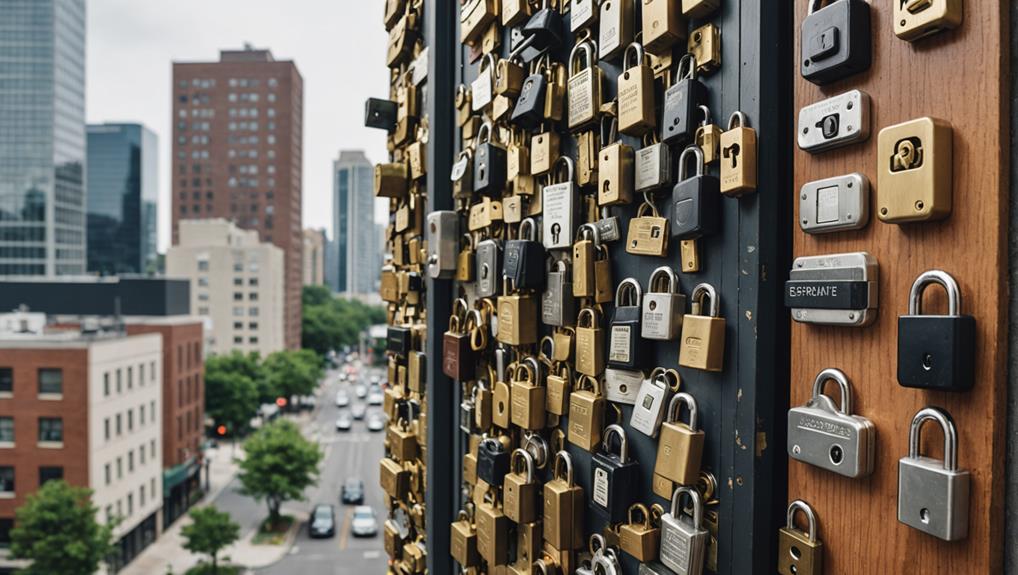
When you consider replacing a lock, your geographic location can greatly affect the cost.
Factors such as regional pricing variations and local market demand contribute to these differences. Urban areas often have higher prices due to demand and availability of services, while rural locations might offer more budget-friendly options.
Understanding these regional price differences can help you plan your budget effectively.
Regional Price Differences
Regional price differences for lock replacement can greatly impact your budget. Depending on where you live, you might find that the costs vary considerably.
In urban areas, the demand for locksmith services is often higher, leading to increased prices. You may notice that the competition among service providers can help keep costs manageable, but it's not always guaranteed.
In contrast, if you're in a rural setting, the price might be lower due to less demand. However, you could face challenges like fewer locksmiths available, which may lead to longer wait times or less competitive pricing.
It's vital to do your research and compare rates in your region, as this can help you make a more informed decision.
Urban vs. Rural Costs
Urban and rural areas show significant differences in lock replacement costs, largely due to factors like demand and availability of services. In urban settings, where locksmiths are more plentiful, you might find competitive pricing. However, high demand can sometimes lead to slightly elevated costs.
On the other hand, rural areas may have fewer locksmiths, which can drive up prices due to limited options.
When considering these geographic variances, keep in mind:
- Availability of Services: Urban areas often have multiple locksmiths, while rural areas may rely on a single provider.
- Travel Time Costs: In rural locations, locksmiths may charge extra for travel, increasing overall expenses.
- Emergency Services: Urban locksmiths might offer 24/7 service, which can be pricier compared to rural counterparts who may have restricted hours.
- Material and Labor Costs: Urban areas may have higher costs for materials and labor, reflecting the local economy.
In your quest to serve others, understanding these differences can help you guide clients accurately based on their location.
Whether urban or rural, you'll be better equipped to provide valuable insights on lock replacement costs.
Additional Installation Considerations
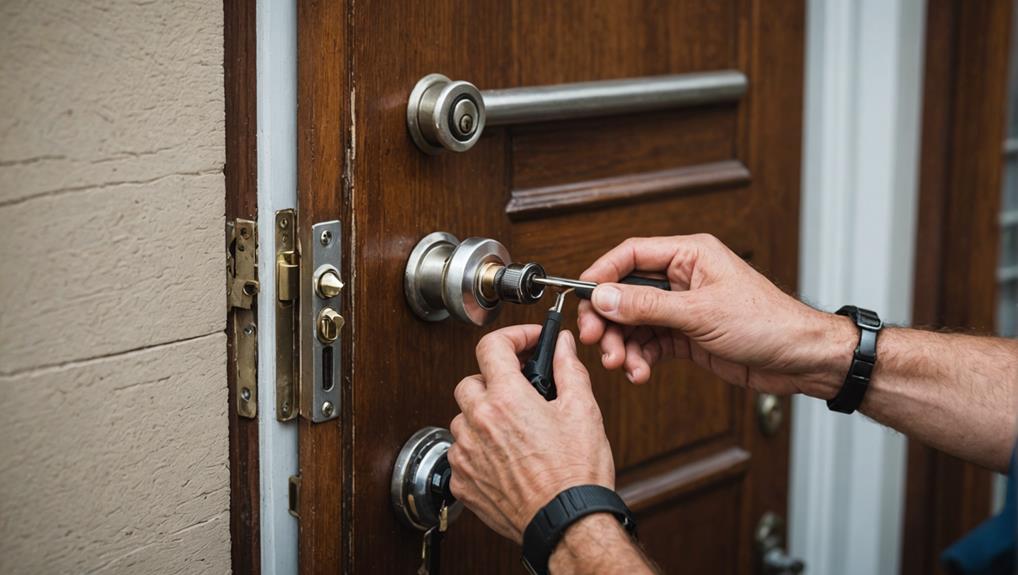
Replacing a lock involves more than just choosing a new one; you also need to contemplate the installation process. Understanding the specific needs of your door and lock type is vital. Consider factors like the door material, existing hardware, and whether you'll need professional help or can tackle it yourself.
Here's a quick guide to help you think through these installation considerations:
| Factor | DIY Installation | Professional Help |
|---|---|---|
| Door Material | Requires proper tools for wood, metal, or fiberglass | Experts know how to handle any material |
| Lock Type | Standard locks can often be replaced easily | Complex locks may need specialized skills |
| Existing Hardware | Compatibility checks are significant | Professionals guarantee a perfect fit |
| Time | Can take a few hours, depending on skill | Typically quicker with experience |
| Safety | Risk of improper installation | Guarantees secure and reliable installation |
Average Price Ranges
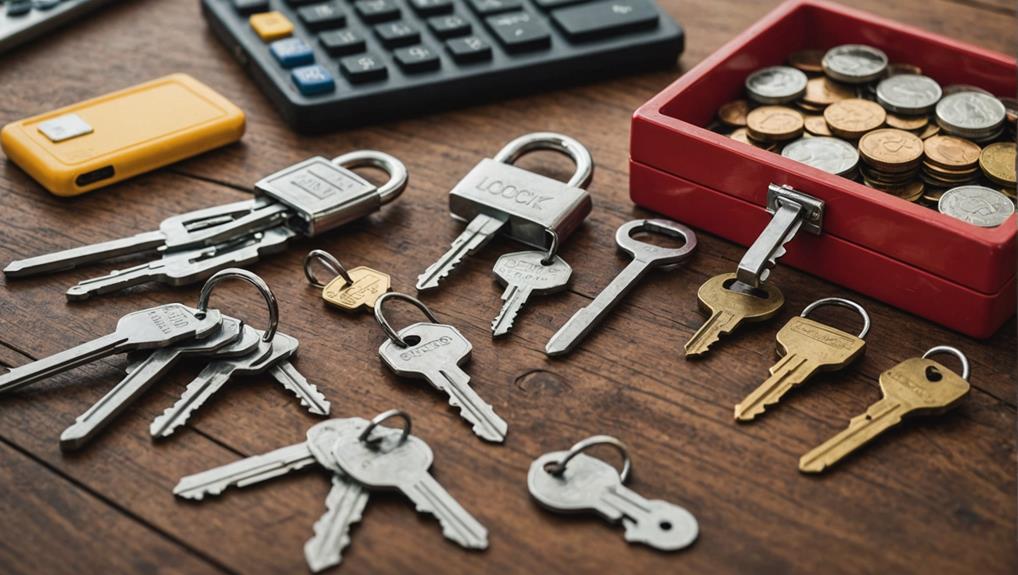
When considering the installation of a new lock, it's important to also factor in the average price ranges you can expect. Understanding these ranges can help you budget effectively while ensuring you provide the best security for others.
Here's a breakdown of what you might encounter:
- Basic Deadbolts: Typically range from $20 to $50, perfect for standard residential needs.
- Smart Locks: These advanced options usually cost between $100 and $300, offering enhanced security and convenience.
- High-Security Locks: Ranging from $150 to $500, these are ideal for those looking to provide maximum protection, especially in commercial settings.
- Installation Fees: Professionals may charge between $50 and $150 for their services, depending on the complexity of the lock and location.
Frequently Asked Questions
Can I Replace a Lock Myself to Save Money?
Yes, you can definitely replace a lock yourself to save money!
It's a manageable DIY project if you have the right tools and some basic skills. Start by choosing the right lock for your door.
Follow the manufacturer's instructions closely, and take your time during installation.
Just make sure to double-check that the new lock functions properly before considering the job done.
You'll not only save cash but also gain a sense of accomplishment!
How Long Does It Typically Take to Replace a Lock?
Replacing a lock typically takes about 30 minutes to an hour, depending on your experience and the lock type.
If you've got the right tools and instructions, you can make it a smooth process. Just remember to take your time and guarantee everything's aligned correctly.
If you're helping someone else, they'll appreciate your effort and skill! Plus, it's a great way to gain confidence in your DIY abilities.
Are There Warranties on Lock Replacements?
When you're considering a lock replacement, you'll want to know about warranties.
Many manufacturers offer warranties that cover defects and malfunctions, typically ranging from a few years to a lifetime, depending on the brand and type of lock.
Always check the warranty details before making a purchase, as it can provide peace of mind.
It's also smart to ask your locksmith about any service guarantees they might offer for their installation work.
What Should I Do if I Lose My Keys?
If you lose your keys, don't panic.
First, retrace your steps to see if you can find them. If not, check with nearby businesses or friends to see if someone might've found them.
Consider contacting a locksmith to help you gain access to your home. It might also be wise to change the locks for security.
Can I Upgrade My Lock Without Changing the Door?
Absolutely, you can upgrade your lock without changing the door!
Many modern locks fit standard door frames, allowing you to enhance security without a full replacement.
Consider options like smart locks, deadbolts, or high-security locks designed for better protection.
Just make sure the new lock matches your current setup.
You'll not only improve safety but also add convenience and style, making your home feel more secure and modern without a significant renovation.
Conclusion
When it comes to replacing a lock, you get what you pay for. Investing in a quality lock can save you money and hassle in the long run. Remember, "an ounce of prevention is worth a pound of cure." So, consider not just the cost but also the security features and installation factors. By choosing wisely, you'll guarantee your home stays safe and secure without breaking the bank. Don't hesitate—protect your peace of mind today!

